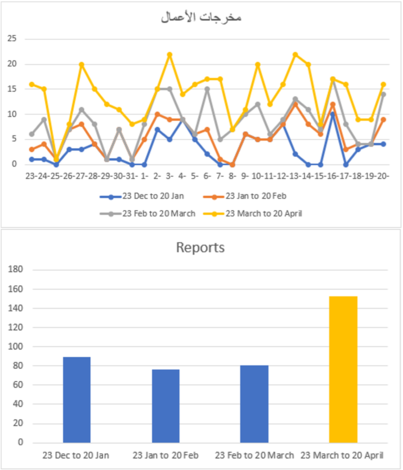B’huth Research Center achieves the highest productivity during Ramadan through Remote Work model.
The Dubai Public Policy Research Centre conducted a study to measure work output during Ramadan and found a 66% increase in productivity compared to the three months leading up to Ramadan. The director of finance and administration at the center attributed this increase in productivity to the center`s shift to remote work during Ramadan, and the study challenges the common belief that work productivity decreases during Ramadan. Remote work policies, which is aligned with Dubai`s National Agenda 2030 and H.H. Sheikh Mohammed bin Rashid Al Maktoum`s vision, were found to increase productivity and employee satisfaction.

- by Mariam Eisa Harib Bin Askour Al Ali ,
- Monday, 12th June, 2023
Dubai Public Policy Research Centre (b`huth) conducted an applied study to measure performance output during Ramadan, and the results were surprising. Performance evaluation indicators demonstrated a significant improvement in total work output, with a 66% increase in productivity compared to the three months leading up to the holy month. Comparison of work output for the months of December 2022, January, and February, compared to the period of Ramadan from March 23 to April 20, 2023, clearly (the yellow line in the graph below) indicates an uptick in performance despite the common belief that work productivity decreases during Ramadan due to shorter working day.
Mariam Eisa Bin Askour, the Director of Finance and Administration at (b`huth), said that the center applied the UAE government directives that during Ramadan, federal government employees should work remotely for 70% of their working hours, and attend their workplace for 30% of their working hours on Fridays and expand it to the whole month. The flexibility of working hours provided by models of remote work (RW) is not new to b`huth, added Mariam, but this Ramadan, it provided more than flexibility; it provided excellence. Results of work outcomes compared to similar periods during previous months demonstrated that the level of self-discipline and dedication displayed by employees while working from home, without any direct supervision, provided a better output for the organization. Means like working chat groups, and open virtual meeting spaces, helped teams to collaborate seamlessly during the time they were not present at the office.
RW, which is aligned with Dubai`s National Agenda 2030, and H.H. Sheikh Mohammed bin Rashid Al Maktoum's vision, for organizations like b’huth, proved to be working, says Mariam.

Mariam Eisa Harib Bin Askour Al Ali
Director of Human Resources Affairs
Read More
Director of Human Resources Affairs

